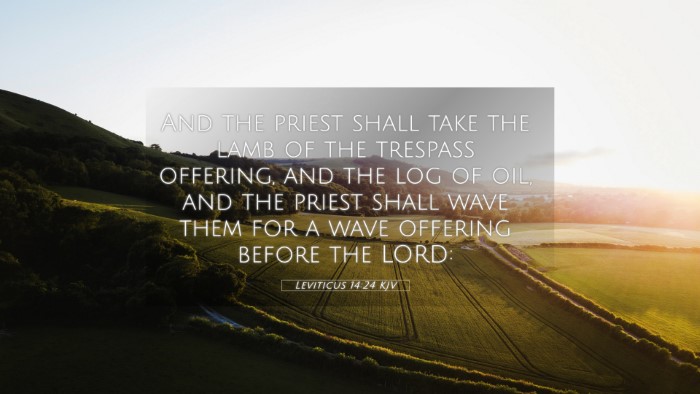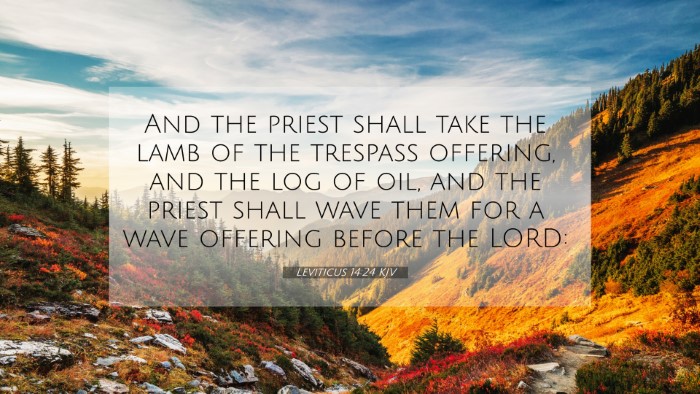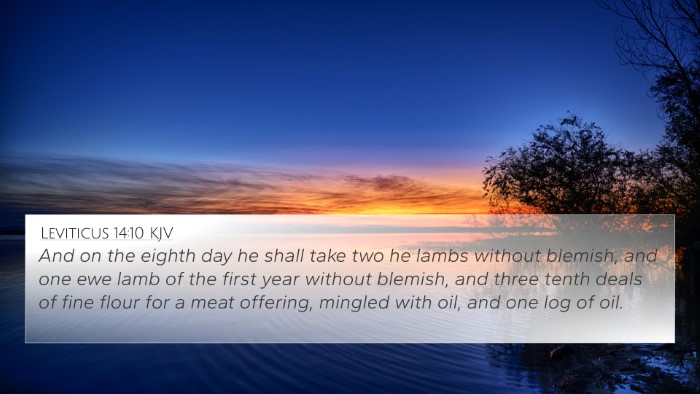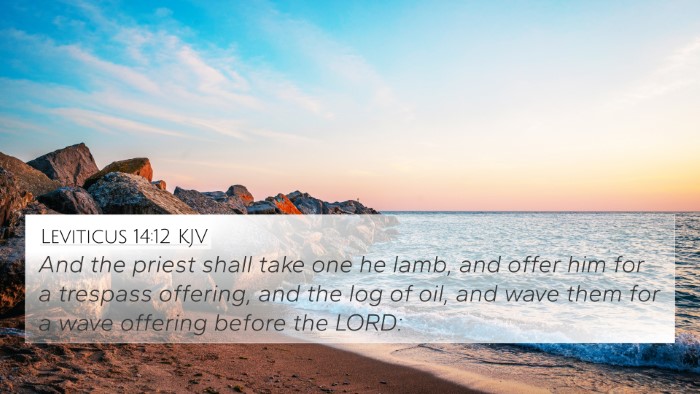Understanding Leviticus 14:24
Leviticus 14:24 states: "And the priest shall take the lamb of the trespass offering, and the log of oil, and the priest shall wave them for a wave offering before the Lord." This verse is part of a larger ritual concerning the cleansing of a leper, illustrating critical elements related to sacrifice, atonement, and restoration within the context of Old Testament law.
Meaning and Context
This verse highlights a specific priestly duty that underscores the significance of offerings in the process of cleansing and restoring individuals who had been marginalized due to illness, here specifically leprosy. The act of waving the offering before the Lord represents a symbolic act of presenting the individual and their needs to God.
Key Themes in Leviticus 14:24
- Significance of Offerings: The lamb represents a substitutionary sacrifice while the oil symbolizes the Holy Spirit's anointing.
- Priestly Mediation: The act necessitates the priests' role as mediators between God and the people.
- Restoration and Cleansing: This passage emphasizes God's desire for restoration, demonstrating that even those seen as unclean can be reconciled with Him.
Commentary Insights
Matthew Henry: Henry notes that this verse reflects God's gracious provision for the leper, as well as the importance of the priest's actions in the ceremonial law of Israel. The waving of the offering symbolizes acceptance and the desire to reconnect with God after a period of separation due to sin.
Albert Barnes: Barnes elaborates on the responsibilities of the priest in this ritual, explaining that the sacrificial system was designed not only for atonement but to express appreciation and dependency on God's mercy. The details of the sacrificial act demonstrate the seriousness with which God treats sin and the necessity for ritual purity.
Adam Clarke: Clarke highlights how the act of waving the lamb and the oil represents a commitment to God and a plea for His presence in the cleansed person's life. He emphasizes the significance of the priest's involvement in ensuring that the individual is ceremonially clean and fit to re-enter the community.
Cross-References
- Exodus 29:24-26 - Discusses the wave offering of a lamb.
- Leviticus 8:27 - Another instance of wave offerings as a part of consecration.
- Numbers 8:11 - The Levites' wave offering to the Lord.
- Isaiah 53:6 - Reflects on the sacrificial themes present throughout the Bible.
- Hebrews 9:22 - Discusses the necessity of shedding blood for forgiveness.
- Luke 5:12-14 - Jesus healing a leper, showing the fulfillment of these cleansing laws.
- 1 Peter 2:24 - Christ as our sacrifice and His role in our ultimate cleansing.
Connections to Other Bible Verses
Understanding Leviticus 14:24 can be further enhanced by examining its connections to other parts of Scripture:
- Thematic Connection: The theme of cleansing from sin through sacrifice is prevalent throughout the Bible and connects to New Testament teachings about Jesus' atonement.
- Inter-Biblical Dialogue: The actions of the priest in this verse are mirrored in Christ's role, as portrayed in the gospels, where He often engages with those considered unclean, showcasing His power to heal and restore.
- Comparative Analysis: Comparing Levitical laws to Jesus' ultimate sacrifice allows for a deeper understanding of the atonement, emphasizing how Christ fulfills the requirements of the law.
Making Connections with Bible Verse Cross-References
For anyone seeking to delve into the meanings and connections within the scriptures, using tools for Bible cross-referencing can greatly enhance one’s study. Whether you employ a Bible concordance or a specific cross-reference guide, these resources assist in identifying connections between Old and New Testament scriptures, enriching one’s understanding of biblical themes.
Practical Application and Study Methods
When studying Leviticus 14:24, consider the following methods:
- Cross-reference Bible study: Identify and read passages that echo the themes found in this verse to uncover broader contexts.
- Bible chain references: Utilize systematic approaches to trace thematic links through scriptures, revealing the interconnectedness of biblical themes.
- Detailed cross-reference: Follow through related verses that link sacrificial themes across different books of the Bible.
Conclusion
Leviticus 14:24 serves as a vivid reminder of God's intricate laws and how they point to the grace and mercy ultimately found in Christ. By exploring the various cross-references and leveraging a comprehensive Bible cross-reference system, believers can grasp the profound significance of this verse and its relevance to one's faith journey today.




